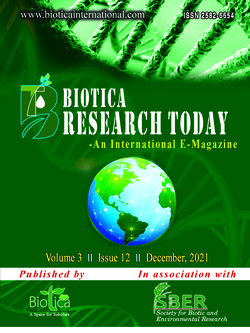
Use of Biofertilizer for Increasing Soil Health and Sustainable Agriculture Production
Pradip Kumar Saini*
Dept. of Crop Physiology, Acharya Narendra Deva University of Agriculture & Technology, Kumarganj, Ayodhya, Uttar Pradesh (224 229), India
Shambhoo Prasad
Dept. Plant Molecular Biology & Genetic Engineering, Acharya Narendra Deva University of Agriculture & Technology, Kumarganj, Ayodhya, Uttar Pradesh (224 229), India
Jitender Bhati
Dept. of Seed Science and Technology, Acharya Narendra Deva University of Agriculture & Technology, Kumarganj, Ayodhya, Uttar Pradesh (224 229), India
D. Ram
Dept. of Horticulture, Acharya Narendra Deva University of Agriculture & Technology, Kumarganj, Ayodhya, Uttar Pradesh (224 229), India
DOI: NIL
Keywords: Biofertilizer, Microorganisms, Soil Health, Sustainable Agriculture
Abstract
When applied to seed, soil, or living plants, a biofertilizer consists of a carrier media rich in live microorganisms that boosts soil nutrients or makes them biologically accessible. The use of biofertilizers in the production system can provide improved productivity on a long term basis. As they thrive in the soil, they form a mutually beneficial or symbiotic connection with host plants. The role of several microorganism strains in crop production and improvement. Soil researchers currently view mycorrhiza fungi and plant growth-promoting rhizobacteria as microorganisms that play critical roles in nutrient availability in the soil to improve plant development and productivity. Microbial biofertilizers are helpful microorganisms that interact with the rhizosphere of plants to improve soil fertility and stimulate nutrient uptake to increase yield. The existing use of chemical fertilizers has resulted in environmental contamination and increased the expense of agricultural operations, indicating that biofertilizer research has a bright future.
Downloads
not found
Reference
Kloepper, J.W., Leong, J., Teintze, M., Scroth, M.N., 1980. Enhanced plant growth by siderophores produced by plant growth promoting rhizobacteria. Nature 286, 885-886.
Mahanty, T., Bhattacharjee, S., Goswami, M., Bhattacharyya, P., Das, B., Ghosh, A., Tribedi, P., 2017. Biofertilizers: A potential approach for sustainable agriculture development. Environ. Sci. Poll. Res. 24, 3315-3335.
Naveed, M., Mehboob, I., Shaker, M.A., Hussain, M.B., Farooq, M., 2015. Biofertilizers in Pakistan: Initiatives and limitations. Int. J. Agric. Biol. 17, 411-420.
Reed, M., Glick, B.R., 2013. Applications of plant growth-promoting bacteria for plant and soil systems. In: Applications of Microbial Engineering. Taylor and Francis: Enfield, CT, USA, pp. 181-229.
Timmusk, S., Behers, L., Muthoni, J., Muraya, A., Aronsson, A.C., 2017. Perspectives and challenges of microbial application for crop improvement. Front. Plant Sci. 8, 49.
